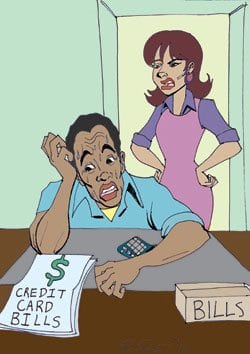
Finally, credit card reform
Credit cards have become the curse of the consumer. The magic of Madison Ave. incites a great appetite for the many goods and services available in America, and the plastic credit card creates the delusion that they are all affordable now.
The process begins with a flattering letter that praises your ability to handle your finances carefully. In recognition of this acumen, the credit card company invites you to apply for a personal credit card.
Very few people read the small print on the contract that comes with the card. In fact, the assistance of a magnifying glass would be necessary. However, the harsh terms will quickly come to light when the interest rate on unpaid balances soars when the credit card company considers you to be a greater financial risk.
Last week, consumers got some relief as the provisions of credit card reform became effective. The law is known as the Credit Card Accountability Responsibility and Disclosure Act, which goes by the acronym CARD. In anticipation of the changes in the law, credit card companies have already instituted a number of changes.
According to CreditCards.com, the average interest rate on new cards averages 14 percent or more, which is the highest rate since 2007. Also, comScore found in a December 2009 survey that 26 percent of credit card holders had their credit line decreased and 53 percent had been notified of interest rate increases. These changes were made in anticipation of the new restrictions.
The interest rates on some credit cards were so high that they made the charges by loan sharks seem modest by comparison. Credit card companies had found ways to circumvent the restrictions on usury. The bad news is that CARD still does not impose any limits on interest rates. The most the law does is to restrict sudden increases in the rates.
Credit cards have always been a perfect device for predatory lending. Companies offer credit to individuals with only superficial credit checking. The expectation is that high interest rates will generate more than enough interest to finance defaults. A delay in the upward adjustment of interest rates reduces cash flow and increases the exposure to loss from deadbeats.
Under the CARD rules, consumers must have 45 days notice of any change in terms and any increase does not apply to existing balances. However, if a debtor is more than 60 days late in making a payment, then the increased rate will apply. If the debtor makes timely payments for six months thereafter, then the rate will be reset to the lower rate.
Several especially odious practices are now changed. The universal default provision is now banned. The interest rate on existing balances cannot be raised because of alleged defaults in unrelated debit accounts. Also, consumers now have 21 days instead of only 14 days to make payments without penalties, and additional fees for payment by phone, electronic device or mail have been eliminated.
An estimated 84 percent of black households have credit card debt. According to an April 2009 Nilson report, American households have an average credit card debt of $10,679. Now CARD requires that credit card companies disclose how long it will take to pay off the debt at the minimum payment each month and what the total interest payment will be. These changes in the law should inspire black families to get rid of this expensive form of credit.






